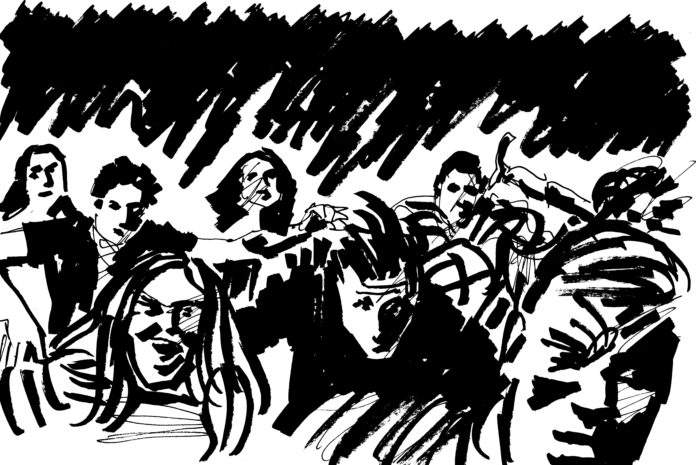Pub. Note: Prolific Ted Leonhardt turns from the fantastical (his 30-part “Ted Talk” serial, which you can access here) to the realistic in his new series titled “Ted Says…” It will deal with issues that no one wants to talk about—or maybe hasn’t even thought about—in these increasingly trying times. His lead-off column, “Time For a Pivot,” which addresses survival, is an example of a subject we’re all struggling with. In writing this new series, Ted will draw from his consulting practice and the creative community, including his new Overture.coop.
By Ted Leonhardt
Most the creatives I know and work with have little property but plenty of debt and are only able to survive by servicing the needs of the high earners.
Our world has been in a massive state of change for a while, with a seemingly unimaginable damaging impact on our lives. And it just got worse.
We’ve experienced this change at a point in time when the Internet makes communication and connection possible—beyond all previous understanding. We’ve seen the creation of digital platforms that extract wealth from use of the platform, advertising and data, while creating a new class of billionaires.
We’ve also experienced the effects of corporations focusing on profitability and shareholder value, without regard for the well-being of employees or the communities we live in.
Seattle now has more than 12,000 living on the streets, while corporate employers resist paying the taxes we need to help the situation. Somewhere around half the U.S. workforce is now made up of freelance, gig or contract employees, with limited healthcare and other benefits that once were considered standard.
On top of these massive changes already in play, we now have a virus among us that has caused the numbers of unemployed to surge to Depression-era levels. The pandemic is predicted to rival the impact of the Black Death among the billion or so who live in the world’s biggest, most tightly packed slums. People can’t practice social distancing when they’re living eight or 10 to a room.
Pivot
With the virus, my creative community is in turmoil—like everyone else.
Here’s what I’m hearing…
“For a few weeks I stayed busy. First with client work, then with my blog and a couple of personal projects. With my savings getting low and only a few bucks still due from past projects, it hit me: I’m in trouble. Real trouble.”
Rent due, projects stopped. What should she do?
“I was thinking about quitting my job and going back to school. But then the virus hit, and I knew I had better stay employed.”
When forces bigger than all of us shift, it’s time to be very careful with our next steps.
“Most of my buddies have been let go, or their freelance gigs have dried up. I’ve been lucky, busier than ever the last four months. In fact, I’m working Saturdays and Sundays. I’m afraid that if I stop—that if I’m not available 24/7—they’ll find somebody else to do the work.”
Afraid he’s working too much. But afraid not to. Fear that we’ll fail. Embarrassed that we don’t have enough work. Feeling shame that we don’t seem to be valued.
“It used to be that referrals kept me busy. I’m not getting any referrals now. I don’t feel good about asking past clients for work. It’s embarrassing. I’m afraid about what it says about me. Maybe it says I’m not good enough. That I didn’t work hard enough or smart enough.”
I ask myself, doesn’t 20-plus years of great brand design count for anything? Not anymore. However, it’s never been a better time to ask for work. Why? Well, with massive unemployment, we’re all in the same boat—one way or another.
Action
Here’s what I’m telling my clients. And these are small steps—survival steps. You may see bigger opportunities for yourself. I hope you do.
If you have a job, hang onto it dearly. Work hard, get support from your peers, do your very best work and don’t hold back your energy or your commitment. Make sure your employer knows how much you appreciate them and the work. Meanwhile, plan your next work source or an additional income stream. Don’t leave your current position until you’re ensured of future income. But be prepared if your day-job ends.
If you’re out of work, make an email list of all those you’ve worked for and with. Write an email reminding them of your skills. Ask how you can help them.
Make a second list: the skills, services and kinds of work you’ve done over the course of your career. Focus on the revenue-producing activities you enjoyed doing the most. From this list, decide which skills most likely would be of help to four or five clients you’ve worked with in the past.
Write individual emails to each of these four or five past clients. Describe how you think you might help them, and ask them what they think. Have your spelling checked. Get someone to edit your work.
Draw up these lists and write the emails concurrently. Send both sets of emails at the same time: one set to the narrow group you think you can specifically help, and the other, more general one, to everyone else.
Try to get these key people on the phone or a video call. Listen. Don’t try to sell your ideas. Do try to extend the conversation and do so with their best interests in mind. The goal is a renewed relationship. And, yes, work—but only work that helps them.
Rinse and repeat.
Next
Okay, now you’re thinking about your next venture. A venture beyond your immediate need for work. A venture that hopefully can provide multiple revenue streams so you’re not so dependent on a single gig.
I think the first place to look is within growth industries and areas that could benefit from your specific skills.
What’s growing in the creative area?
- 3-D printing and rapid prototyping
- digital illustrations
- marijuana marketing, packaging, ads
- healthcare branding, marketing
- entertainment and information apps
- online gaming
- graphic novels and comics
- serial literature
- infographics
- online training and education
- how-to videos
- young adult books
- podcasts
- ecommerce
Make your own additions to the list—additions that fit your skills and past experiences. Try to stay within industries that are growing.
Online stores and fulfillment platforms provide infrastructure that supports creative product development. Etsy, Printful and their competitors provide creation on demand, plus delivery and marketing support services, to make creating and marketing your own products easier than at any time in the past.
Yes, using these services does tether you to their platforms. And they control the fees. But they do give you access to the potential of global sales and a large following.
Go for it
The world already was changing before the pandemic hit. The digital revolution was well underway, affecting everything from dog walkers to aircraft manufacturers. Salaries and fees paid to creatives haven’t risen since the early ’90s. Things haven’t been exactly rosy for creatives for years. Anxiety increased with the virus, and with news so dark, depression threatens. It sure does with me.
Looking at the bright side doesn’t cut it. What does help is our work; as one of my clients reminded me, “I find that when I’m working on a project, even if it’s just for myself, it takes me away from the news and the feeling of doom. The news is awful. With work I focus, feel better about myself and regain my balance.”
Planning our next income-producing venture can provide relief from the turbulence that surrounds us. Relief from the destruction and an opportunity to open new possibilities.
In the short term, we creatives are caught in a position between a world of what used to be and a world we don’t fully understand yet, because it changes drastically nearly every week. Every step we take toward gaining new sources of income will help us navigate this new world and regain control of our future.
—-
 Ted Leonhardt built and sold a Seattle brand-design consultancy and worked as Chief Creative Officer/Global for Fitch before writing his first book, Nail It: Stories for Designers on Negotiating with Confidence. On selected Saturday’s from 10 to noon, Ted hosts a Mentor Morning on Zoom. The group is limited to 8. The discussion is always around how to survive and thrive as a creative in today’s volatile world. The next session is Saturday 5/16/20. Sign up here … https://tedleonhardt.com/ted-events/zoom-mentor-morning-imagine/
Ted Leonhardt built and sold a Seattle brand-design consultancy and worked as Chief Creative Officer/Global for Fitch before writing his first book, Nail It: Stories for Designers on Negotiating with Confidence. On selected Saturday’s from 10 to noon, Ted hosts a Mentor Morning on Zoom. The group is limited to 8. The discussion is always around how to survive and thrive as a creative in today’s volatile world. The next session is Saturday 5/16/20. Sign up here … https://tedleonhardt.com/ted-events/zoom-mentor-morning-imagine/






